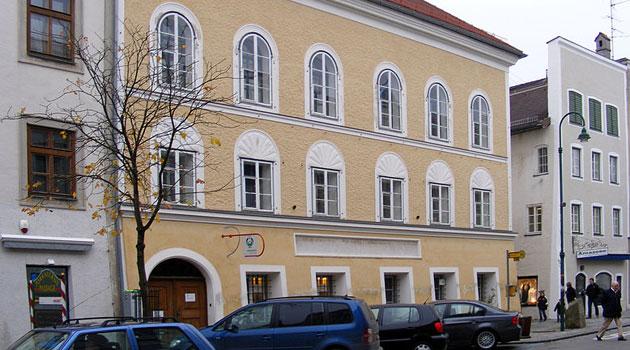Austria still trying to decide what to do with Hitler's birthplace

"It’s the same circus here every year," mumbles a passer-by, glancing at the small assembly in front of the golden-yellow facade. Adolf Hitler still casts a shadow over his birthplace of Braunau am Inn even 70 years after his suicide on 30 April 1945.
Agence France-Presse reports that on 18 April, the small town in western Austria on the border with Bavaria was the site of a march by several dozen antifascists wearing sunglasses (despite the rain). The 800-square meter building in front of which people are gathering is the house in which Hitler was born.
The building symbolizes a past that remains alive. March organizer Astrid Hainz, says the town leadership has been pretending the building doesn’t exist – even though a memorial stone honoring the victims of Nazism has been placed there.
"It’s here and something has to be done about it. This is our responsiblity," she says.
The Austrian Government wanted to prevent the building from becoming a target of neo-Nazi pilgramages, so in 1972 it signed an agreement with the owner, Gerlinde Pommer. The terms of that agreement are that the building may only be permitted for administrative or social-educational purposes, explains Karl-Heinz Grundböck, spokesperson for the Austrian Interior Ministry.
That’s how Hitler’s house, as the locals call it, first became a shelter for persons living with disabilities – a category of persons victimized by the Nazi regime. After 35 years of such arrangements, however, Ms Pommer refused to perform an essential reconstruction to the property, so the agreement on its use expired.
The two-story building has been empty since 2011, to the great regret of the Austrian state, which has paid a total of EUR 240 000 to rent the facility over the years. Now Austria is running out of patience.
"We issued a tender for managing the property, but we are also considering expropriating it altogether," Grundböck says. A lively discussion about the building is now underway in Braunau, a town of 17 000, between those who would like the building to shelter refugees and those who would rather see it become a museum about the liberation of Austria.
The owner of the building is maintaining her silence on the issue. Her family has owned the land for more than 100 years, with the brief exception of the Nazi era.
"She inherited the building and she is collecting money without upholding her part of the agreement. She could make a gesture and gift the building to the republic," says local historian Florian Kotanko.
Like the handful of antifascists who come to Braunau am Inn every year, Kotanko believes that the town where the dictator was born on 20 April 1889 must deal with this troubling legacy. "There is no point in destroying the building because people will continue to be fascinated by the location. People want to see where the man who was capable of annihilating a large portion of the population of Germany, Austria and elsewhere was born," the historian emphasizes.
"Local people do not deserve to be reviled because of this building. Braunau is not a place where these crimes were perpetrated – its only crime is that Hitler was born here," says Mayor Georg Wojak.
Braunau residents, however, will evidently be confronted with their town’s past, which Hitler mentions in his book "Mein Kampf", for the foreseeable future. Some are beginning to face up to that past in a determined fashion, says Monika Raschhofer, the editor of the local newspaper.
The days when locals would misdirect tourists looking for the building are said to be in the past. "When I have guests here, I always show them Hitler’s birthplace and the memorial stone. It’s a part of Braunau," Raschhofer says.